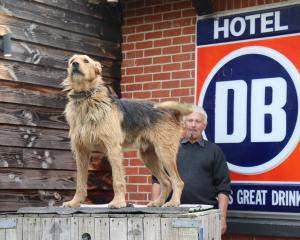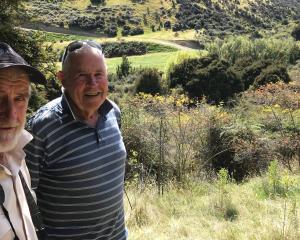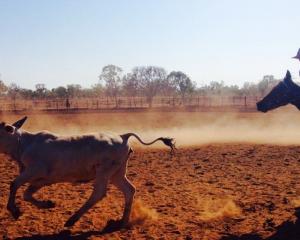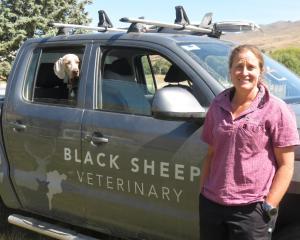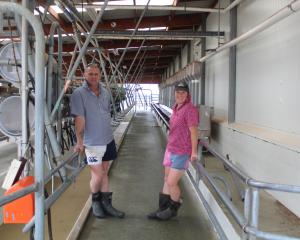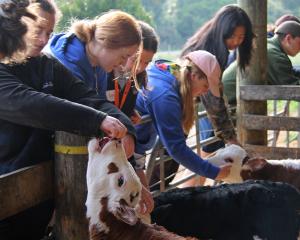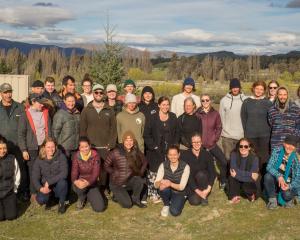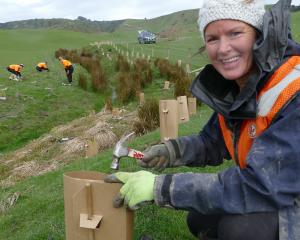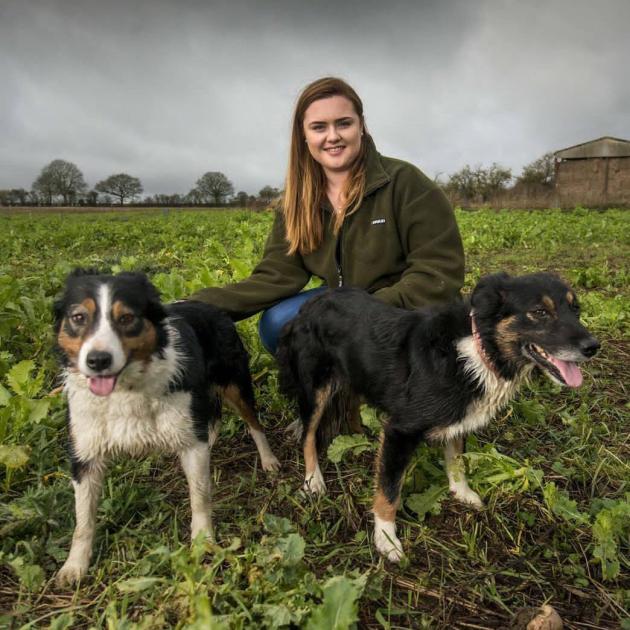
Sheep and dogs are a passion for English shepherd Alex James.
Mrs James - a National Sheep Association Next Generation ambassador - and her husband Jack have been in New Zealand on a belated honeymoon where she has been able to indulge her interests.
Mr James is gamekeeper on an estate owned by film-maker Guy Ritchie, ex-husband of Madonna and the man behind films Lock, Stock and Two Smoking Barrels, Snatch and Sherlock Holmes.
The couple met at Sparsholt College, where Mr James was studying game and wildlife management and his future bride was learning about agricultural management.
Mrs James' interest in working with sheep stemmed from staying with a great-aunt who was a housekeeper on a large estate in Wales. The young Alex used to visit, feed the lambs and spend time with the shepherds, who became like a second family.
They taught her "the basics'' and she decided on a career working with sheep.
When she met Mr James, she did not think they would ever be able to have their own sheep so she aspired to work as a shepherd.
She is now a contract shepherd, doing general shepherding duties, including dog work, drenching and electric fencing, as most sheep are kept behind electric fences.
She works mostly for one person at the moment, looking after 2500 commercial ewes. She said the sheep were a "bit of everything'', based on various breeds, with no set type.
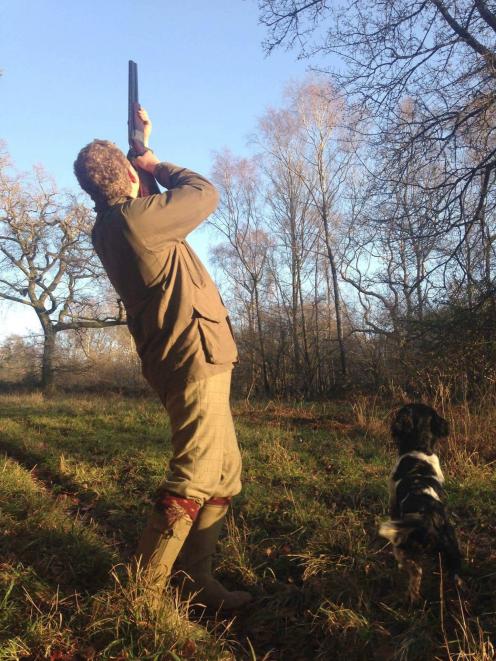
The couple live in Dorset, the home of Dorset sheep, and their own particular interest is in Poll Dorsets, a breed developed in Australia from Dorset Horns.
She said she was very interested in genetics and she and Jack had 100 Poll Dorsets; Jack's father used to breed Dorset Horns.
They liked the breed - the ewes milked well and had great mothering ability and the couple were getting very good feedback about their carcasses, she said.
Their ewes used to lamb in March, when she was busy lambing for other people, so Mr James was left in charge of the flock. They had since changed to lamb out-of-season so it did not coincide with such a busy time.
After they bought their first ewes, they were so nice that Mrs James decided it would be a waste to run them commercially to a continental ram.
So they got their first ram and phased out their commercial crossbred sheep and "haven't really looked back''.
They had some New Zealand genetics in their flock, including the grandson of an Adelong ram bred at Neville and Dianne Greenwood's stud in Canterbury.
He had proved an asset to the stud, with structural correctness, good feet, length, an excellent loin and also ease of management, she said.
Mrs James was keen to have a more extensive, easier style of sheep rather than one that needed higher input.
During their visit to the South Island, they had visited various Poll Dorset studs and she had enjoyed seeing plenty of sheep.
It was nice to see how the breed had progressed in New Zealand, and also to meet the breeders, and the couple were looking at importing some New Zealand genetics in the future.
They had been very impressed with the sheep they had seen; the correctness was above anything she had seen in the UK, she said.
She was also impressed with the ease of lambing, as it was quite normal to regularly have to lamb ewes in the UK, she said.
As she had worked with New Zealand genetics at home - not just Poll Dorsets but also Romneys and Suffolks - she had been aware of minimal input systems.
Those genetics were a bit too diluted in the UK at the moment, which was why they were keen to import some.
Visiting New Zealand had been the best way to see the sheep and the systems they were farmed under and talk to the people who farmed them. It was also creating connections and networks, she said.
Their long-term objective was to increase their stud size, get the genetics right, with ease of management, and produce a product for the market they were trying to meet.
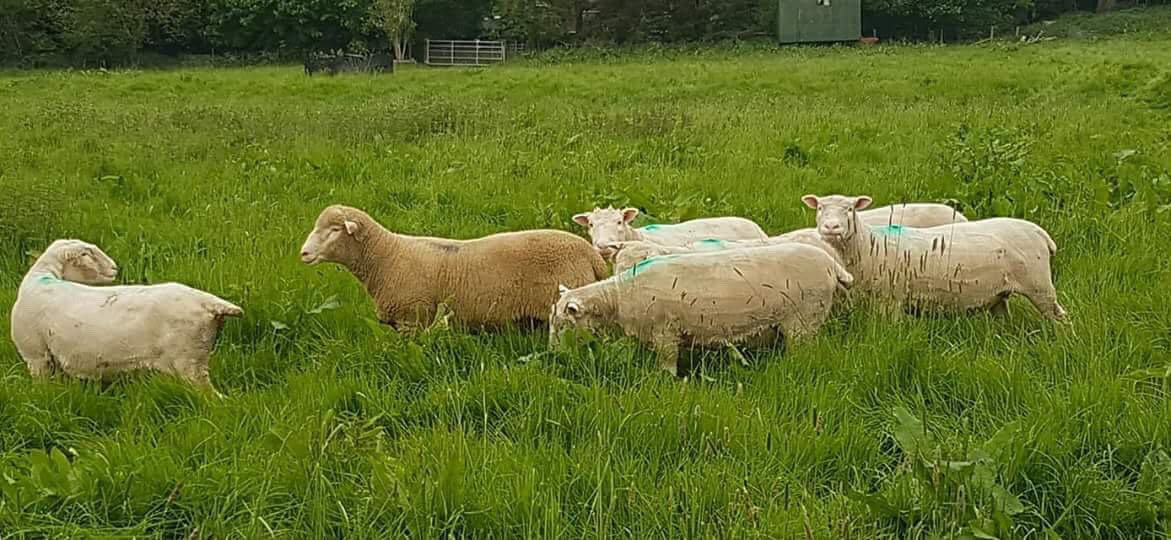
Mrs James was selected last year as a National Sheep Association Next Generation ambassador, an initiative that promoted young people into the industry. It includes five different sessions throughout the year, including a visit to the British Wool Board's headquarters in Bradford. It was good to spend time with other like-minded people of a similar age, she said.
Mrs James said she loved her dogs and quipped they saw her more than her husband did, as she spent so much time with them.
She had three Border collies, all from the same line, and a New Zealand huntaway called Fern, which came from Wales.
She had always admired huntaways and she said it was nice to attend the Omarama Collie Dog Club's trials at Dalrachney Station, in the Lindis Pass.
The couple also enjoyed a visit to top dog triallist Ginger Anderson's home, Ben Omar Station, at Omarama, which included an opportunity to view his dogs.
One of the reasons she came to New Zealand was to find out if she was training Fern correctly.
"You can read as many books and watch as many DVDs but it's actually getting out and talking to people that really know the breed. I would say, in the UK we lack the facilities for people to source the training,'' she said.
Jack James also had dogs - spaniels - which he used in his gamekeeper's job. He is one of about 3000 full-time gamekeepers in the UK.
His job mostly revolves around habitat management and predator control. Nearly 60,000 pheasants and red-legged partridges are reared for shooting 60 days of the year.
Mr James said he enjoyed the habitat management aspect of the job and being outside.
"Half the job is conservation, really,'' he said.
During the shooting season, he rubbed shoulders with royalty and rock stars, as Guy Ritchie lived on the estate.



